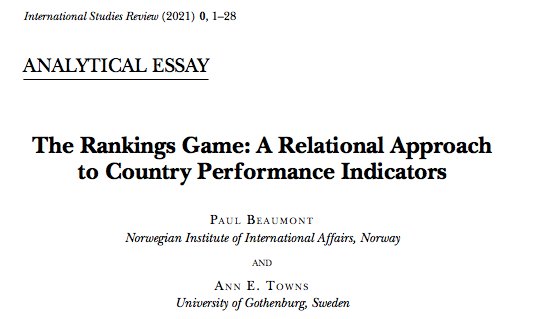
I'm delighted to announce that an article I've been working on with @AnnTowns3 since 2017 just came out (open access) in @IntlStudiesRev The article builds upon the growing scholarship problematizing the (relentless) rise of international rankings academic.oup.com/isr/advance-ar… Thread 

The article does three things. First, we take stock of the wealth of increasingly sophisticated scholarship documenting the dubious data, perverse side effects, and de-politicising consequences of rankings. (e.g. @CooleyOnEurasia , @k_freistein 2/ 

We suggest these strands of research and critique, each imply a distinct puzzle related to why and how rankings persist and flourish even amidst seemingly fatal criticism 3/ 

Taken together, we contend this scholarship provides the warrant for research agenda exploring foregrounding the political, social, and economic relations that keep any given dodgy indicator in business and in use. 4/
Indeed, the second aim of the article is to develop a new heuristic - extending Judith Kelley's "scorecard diplomacy" metaphor - for foregrounding the relations and interests that are implicated in the persistence and reproduction of any given rankings "game"5/ 

In short, we suggest rankings establish their creators as "referees" while necessarily also identifying "players": state agencies willing to play the game and submit to the authority of the referee. These relations are well studied by prior work, however we add.. (6/).
that understanding the persistence of any given ranking requires also investigating the role of "coaches": consultants and other actors help states play a rankings game, as well as the role of audiences, whose use of CPIs is essential to their ability to exert pressure. 7/.
Taken together we suggest treating the relations that emerge and grow out from a ranking - between players/referees/coaches/audiences - as "indicator industrial complexes" 8/
Like their more famous military cousin, an indicator industrial complex can produce and accentuate problems that require costly, publicly funded, solutions, & embody relations that become so embedded that they fade into the machinery of international politics. 9/
By “naming the beast” and developing a relational framework that helps shed light upon
its workings, we hope to inspire further research and public capacity to critically examine CPIs. 10/
its workings, we hope to inspire further research and public capacity to critically examine CPIs. 10/
Although the article is mainly theoretical, we illustrate the utility of our approach by investigating how Scandinavian countries found themselves competing in the Nation Brand Index, which is a ranking operating at the epicenter of the nation branding policy field. 11/
Okay, I will leave it there! Hope this sounds interesting to some of you. Please feel free to get in touch if you are also working on country rankings. @AnnTowns3 & I are plotting more indicator-related research in the future and would be up for, and may organise workshops/panels
• • •
Missing some Tweet in this thread? You can try to
force a refresh


